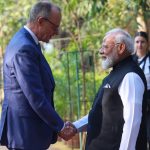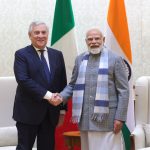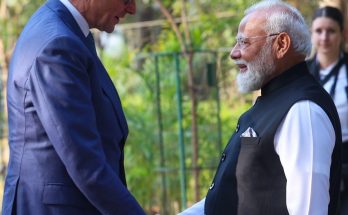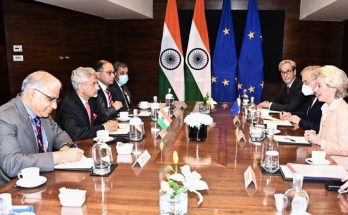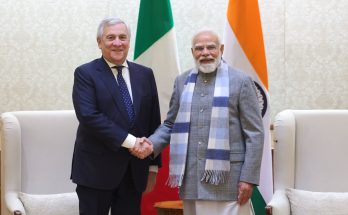After a thousand visions and revisions, India’s ruling coalition has finally put the intensely debated India-US nuclear deal on fast track. The July 22 trust vote in parliament swung the balance in favour of the big deal. But, sadly, even as India marches ahead to join the brave world of global nuclear commerce (although the NSG passport has yet to be acquired), the dramatic manner in which three MPs of chief opposition party BJP flashed wads of currency notes in parliament and charged they had been bribed to abstain from voting has exposed the insidious machinery of wheeling-dealing that went into shoring up support for the government and the deal.
It boggles one’s mind to think that some politicians who till the other day abused the India-US civil nuclear deal (nothing civilian about all these fulminations) and saw in it a grand conspiracy to barter away six decades of India’s hard-earned independence are now singing paeans to the self-same deal. They have finally seen the light, they say with an almost mystic wistfulness as though God himself whispered in their ears last night and wished away their anxieties. But we all know how the scruple-less can quote the scripture to justify whatever they might be doing. And so a million deals were struck in the shadow of the big deal. And all this deal-making was done in the name of “national interest.”!
“The deal is in national interest,” the deal convert would say after striking his own little deal on the sidelines.
Never mind that Rs 25 crore – a fictitious price for an elected legislator willing to convert to the deal, but which became a larger-than-life truth after it was repeated a hundred times in television studios and in the political bazzar – is not little money in a country where millions live on less than $2 a day. And, on the other end of the political spectrum, the deal-baiter would say with an equal fervor: “The deal is a sell-out of national interest,” as Comrade Prakash Karat and his fellow-ideologues never tire of reminding those whose national conscience didn’t exactly go to sleep after India’s fabled midnight tryst with destiny. “National interest,” thus, became a stirring war cry, rallying the faithfuls and skeptics alike. If one can count the number of times this clichéd expression was used by politicians and dealmakers in the power capital of India last fortnight, it would easily make it to the list of most used-and-abused phrase in the Guinness Book of World Records.
But the political tamasha – an unbeatable Indian expression that could be roughly translated as “circus” – does not end here. As Indian politics became a veritable stud farm and big game hunt (parties poaching each other’s MPs), Indian MPs languishing in jails for many lurid and colorful crimes, real and fabricated ones included (it’s hard to distinguish what is what in these deal-making times) found themselves back in the courtship game. Every vote mattered, and it does not matter if you have a murder or rape charge against you as long as you back the deal. In the end, all is forgiven to those who know how to deal with the world as it is. The thin dividing line between fantasy and facts blurred as the nuclear deal worked its magic on those who had no illusions about how the power and money game works.
No wish, however fantastical it sounded, suddenly started sounding credible as long as you saw a congruence of personal and national interests in backing the deal. The party that played the saviour of the deal with its 33 race horses in the game (six of them later switched sides), literally rescuing the Manmohan Singh government and the nuclear deal from an imminent demise, thought they could get away with anything. And they were not exactly wrong in thinking so. You could ask just about anything under the sun: ministerial berths, sack ministers you don’t like, plug for corporate bosses and pretend that you are still outside the government.
The deal-baiters were not short of inspiration either as they cooked up the most bizarre conspiracy theories to rationalize their seemingly blind prejudice to the deal which they thought was not just about having a fling with America, but having a serious sexy relationship with the bitch. One of the fanciful theories had it that Manmohan Singh was in tearing hurry to go to the IAEA as he feared that Israel may attack Tehran with a silent nod from Washington. How will Manmohan Singh the sell the deal to 140 Indian million Muslims who imagine themselves to be part of the worldwide umma?, they asked, delighting in their sovereign sarcasm. Can one argue with this kind of runaway paranoia that belongs more to the realm of spy thrillers than to the world of realpolitik?
You may be wondering why am I am telling you all this with so much relish? Nothing new in it, after all. We all know it. Why talk about the obvious? But that’s precisely the point: we have become so immunized against sleaze and banality in public life and discourse that we no longer feel any rage at this hard-core pornography of power that was shamelessly enacted before the nation to save a deal that did not really require this kind of cynical deal-making. Come to think of it, the nuclear deal did not need its new-found saviours. The deal has much to speak for itself – if one can cut all that rhetorical foliage that has clustered around it, it’s essentially a give-and-take operation like any good deal is. In the summer of 2005, India agreed in principle to place 14 of its civilian nuclear reactors under permanent international safeguards in return for permanent fuel supplies from international suppliers of nuclear fuel. India’s strategic programme was not on the table. Conspiracy theorists should read closely the terse July 18, 2005 India-US joint statement to pacify their doubts. Arguably, this was the only way India, which told the world point blank that it will never sign NPT, could re-enter global nuclear market after it conducted its first nuclear test in 1974. The agreement was done on the principle of reciprocity. If one side does not keep part of its bargain, it can opt out. Reduced to bare bones, this is the essence of the nuclear deal which is a deal not just with the US but with all 45 nuclear supplier countries of the world. There are, of course, significant details but they all flow from this basic understanding.
Am I guilty of oversimplifying complex issues that impinge directly on the sovereignty and security of over one billion people dreaming of a better life and a place on the global high table? Am I giving away India’s sovereign right to test a nuclear device, which it may need to do to guard against neo-imperialist designs of a neighbouring nuclear power? Or, as nuclear ayatollahs say in the US, the deal gives India too much for too little: having your cake and eating it too – get an access pass to international fuel market and save some stealthily to make more bombs? Am I speaking in national interest? Or, could it be that I am a CIA agent and an American stooge by choice – the kind who is still sold on the ‘American Dream,’ despite the nightmare it has spawned in Baghdad and Kabul? Am I too gullible to be tricked into a bad marriage? May be. May be not. But should I imagine the worst when starting a new relationship? Or would it be better to exult in my magnificent isolation? Better still, should I stop living because one day everything will turn to dust, as the Bible says. These are seminal existential questions and there can be only tentative answers to them.
History is bristling with tale of megalomaniacs who touted final solutions, but I am not one of them. But sadly speaking, not one of these fence-sitters and waverers who saw the light and intimations of their wish-fulfilment after the Left famously pulled the plug on the Manmohan Singh government in the afternoon morning of July 9 and voted for the deal July 22, plunging India into an orgy of deal-making in the name of national interest, were not really asking these questions. They were doing their maths; but numbers are not arguments. The 123 of the nuclear deal is not some esoteric higher mathematics or arcane nuclear physics. It’s about you and me, the choices we make and the world we live in and India’s place in that world. It’s about being good argumentative Indians and not eschewing our sovereign right to act in our national interest. Here I go again – is there no escaping from the mantra of national interest?
Author Profile

- Manish Chand is Founder and Editor-in-Chief of India Writes Network (www.indiawrites.org) and India and World, a pioneering magazine focused on international affairs. He is CEO, Centre for Global India Insights, an India-based think tank focused on global affairs.
Latest entries
 India and the WorldJanuary 13, 2026India, Germany raise the bar for defence, economic ties
India and the WorldJanuary 13, 2026India, Germany raise the bar for defence, economic ties India and the WorldDecember 12, 2025India-Italy bonding: Tajani’s visit raises the bar for business, maritime ties
India and the WorldDecember 12, 2025India-Italy bonding: Tajani’s visit raises the bar for business, maritime ties In ConversationNovember 26, 2025G20 is a Force for global Good
In ConversationNovember 26, 2025G20 is a Force for global Good articlesNovember 26, 2025Rescuing G20 from North-South divide: Ubuntu Moment
articlesNovember 26, 2025Rescuing G20 from North-South divide: Ubuntu Moment

